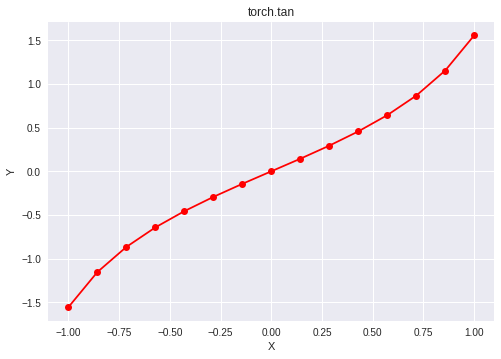Python | PyTorch tan() method
Last Updated :
05 Jan, 2022
PyTorch is an open-source machine learning library developed by Facebook. It is used for deep neural network and natural language processing purposes.
The function torch.tan() provides support for the tangent function in PyTorch. It expects the input in radian form and the output is in the range [-∞, ∞]. The input type is tensor and if the input contains more than one element, element-wise tangent is computed.
Syntax: torch.tan(x, out=None)
Parameters:
x: Input tensor
name (optional): Output tensor
Return type: A tensor with the same type as that of x.
Code #1:
Python3
import torch
a = torch.FloatTensor([1.0, -0.5, 3.4, -2.1, 0.0, -6.5])
print(a)
b = torch.tan(a)
print(b)
|
Output:
1.0000
-0.5000
3.4000
-2.1000
0.0000
-6.5000
[torch.FloatTensor of size 6]
1.5574
-0.5463
0.2643
1.7098
0.0000
-0.2203
[torch.FloatTensor of size 6]
Code #2: Visualization
Python3
import torch
import numpy as np
import matplotlib.pyplot as plt
a = np.linspace(-1, 1, 15)
b = torch.tan(torch.FloatTensor(a))
print(b)
plt.plot(a, b.numpy(), color = 'red', marker = "o")
plt.title("torch.tan")
plt.xlabel("X")
plt.ylabel("Y")
plt.show()
|
Output:
-1.5574
-1.1549
-0.8670
-0.6430
-0.4569
-0.2938
-0.1438
0.0000
0.1438
0.2938
0.4569
0.6430
0.8670
1.1549
1.5574
[torch.FloatTensor of size 15]

Share your thoughts in the comments
Please Login to comment...